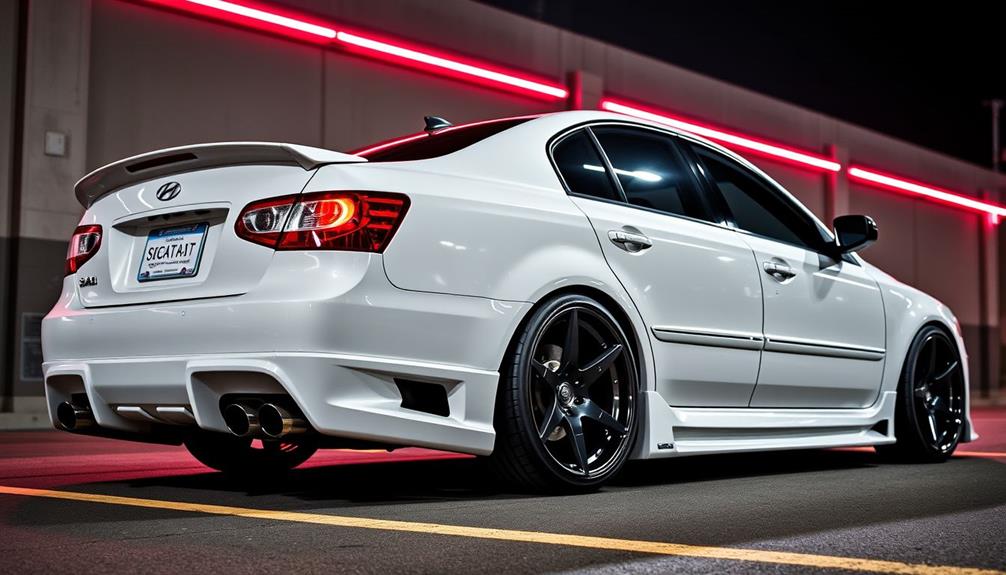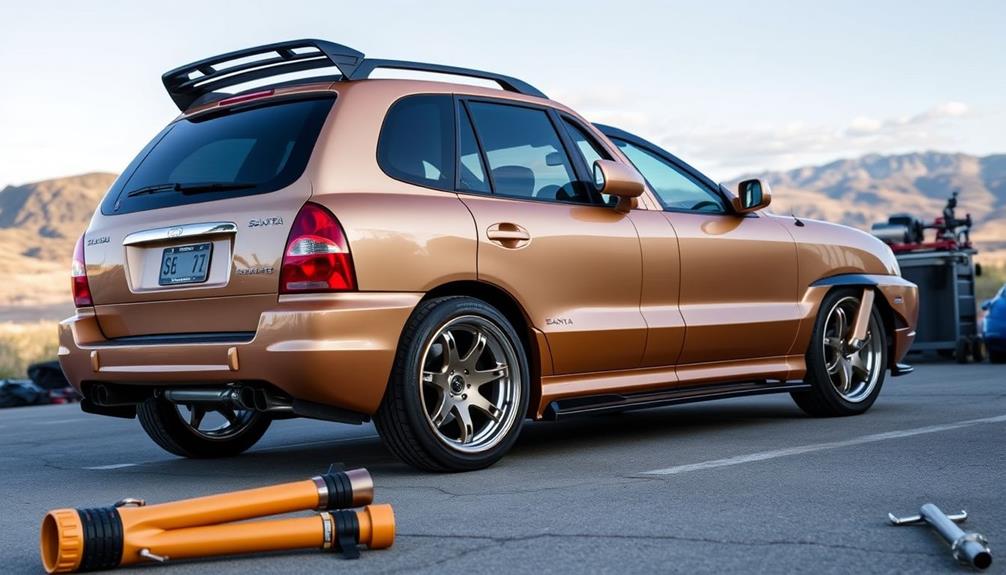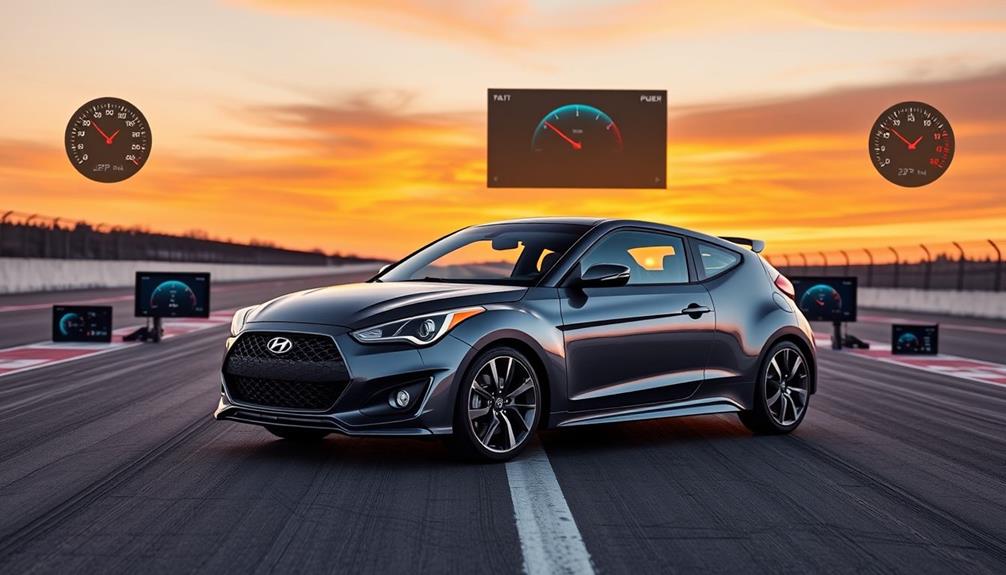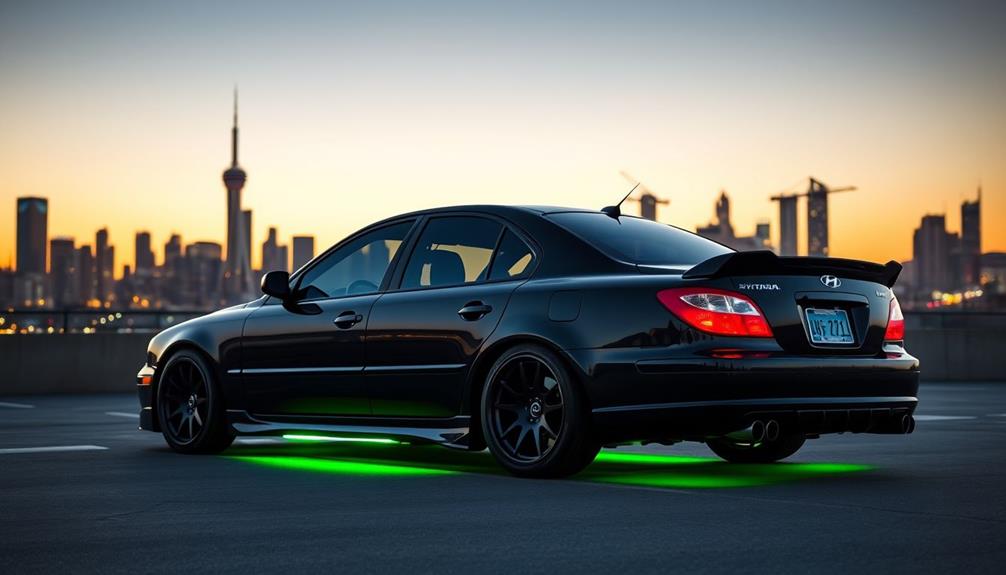Tuning your Hyundai Tucson can completely transform your SUV into a high-performance beast. By utilizing performance chips and custom ECU reflashes, you can boost your engine power and efficiency, potentially adding up to 15 horsepower and improving fuel economy by about 10%. Upgrading components like exhaust systems and installing turbochargers can amplify performance considerably. Community insights reveal that many drivers enjoy substantial gains and enhanced drivability after tuning. Just remember, regular maintenance is essential to keep your Tucson running smoothly. Stick around to discover more tips and tricks for optimizing your Tucson's performance.
Key Takeaways
- Performance tuning with chips and ECU reflashes can enhance the Tucson's engine by adding up to 15 HP and improving fuel efficiency by 10%.
- Installing a turbocharger can yield an additional 40-50 HP, but may require custom modifications and can void factory warranties.
- Upgrading the exhaust system can reduce back pressure, boosting horsepower by 10-20 HP while potentially improving gas mileage by 1-2 MPG.
- Regular maintenance, including synthetic oil changes and oil catch cans, is crucial for sustaining performance gains after tuning modifications.
- Understanding local emissions regulations is essential to ensure compliance and avoid penalties when modifying your Hyundai Tucson.
Understanding Tucson Performance Tuning
When it comes to maximizing your Hyundai Tucson's performance, understanding the basics of performance tuning is essential. Your Tucson, equipped with a 2.5L I-4 engine producing 187 hp, is a solid candidate for enhancements.
One effective way to boost its capabilities is by installing a performance chip. These chips can optimize your engine's tuning, leading to increased power and, importantly, better fuel efficiency. Many users have reported gains of around 10% in MPG after tuning.
Additionally, custom ECU reflashes can provide notable improvements, adding around 15 HP and up to 23 lb-ft of torque without compromising factory performance. The result? You'll experience a noticeable enhancement in throttle response and acceleration.
Don't overlook the potential of turbocharging, either. While this is a more significant modification, it can dramatically elevate your Tucson's power output, with some options adding 40-50 HP.
Ultimately, understanding performance tuning gives you the knowledge to transform your SUV into a more dynamic driving experience while maintaining reliability. So, whether you're after power or efficiency, tuning is the key to revealing your Tucson's full potential.
Key Modifications for Enhanced Power
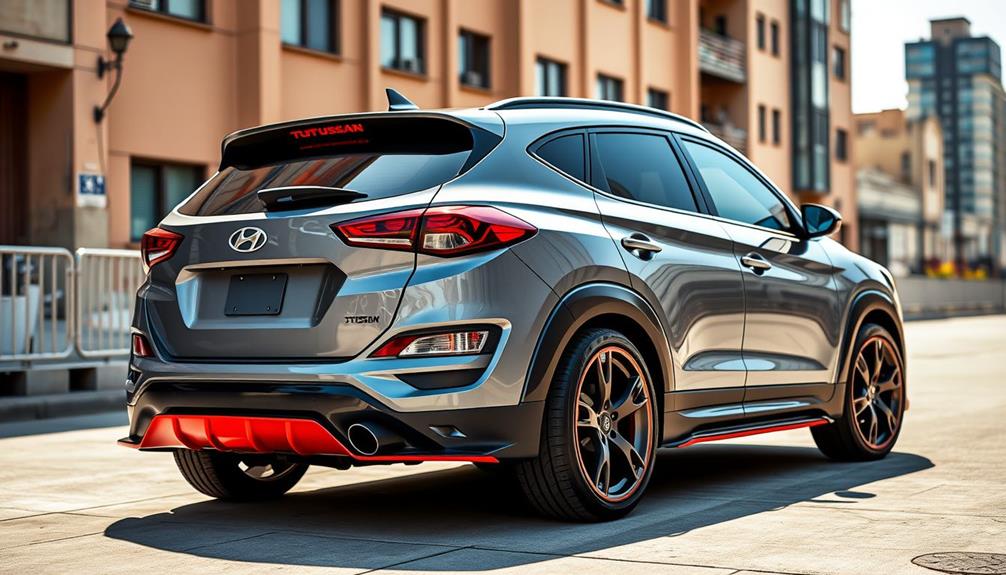
If you're looking to boost your Tucson's power, consider some key modifications like engine performance chips and turbocharger installations.
Upgrading your exhaust system can also enhance airflow and improve overall engine efficiency.
Each of these changes can transform your driving experience and maximize your vehicle's potential.
Engine Performance Chips
Engine performance chips are among the most effective modifications for boosting your Hyundai Tucson's power and efficiency. By installing performance chips, you can experience improved throttle response and increased horsepower. Many users report gains of about 10% in gas mileage, especially with options like the Stage 1 RocketChip ODB plug-in.
Here's a quick overview of the benefits of engine performance chips:
| Modification Type | Potential Gains |
|---|---|
| ECU Reflashes | Up to 15 horsepower |
| Piggyback Tuners | 18-23 lb-ft torque |
| Stage 1 RocketChip | Approximately 10% MPG boost |
Community feedback highlights the importance of proper tuning and driving techniques. While direct injection engines are already optimized, performance chips can still enhance your Tucson's potential. Some users have achieved incredible gas mileage numbers, with reports of 27 MPG in the city and 31-32 MPG on the highway. So, if you're looking to transform your SUV into a high-performance beast, investing in engine performance chips is a smart move. Just remember, results can vary based on your vehicle's specific setup!
Turbocharger Installation Options
For those looking to take their Hyundai Tucson's performance to the next level, turbocharger installation stands out as a powerful modification.
By adding a turbocharger, you can expect a significant boost in horsepower, potentially gaining 40-50 HP for turbo-equipped models. While companies like Shark Racing offer turbo options for various Hyundai models, specific kits for the Tucson may be limited, which means you might need to explore custom solutions.
If you're considering a modest turbo installation on the new 2.5 Smartstream engine, you could see enhanced performance as the engine matures and aftermarket support grows.
Keep in mind that turbocharging often requires additional modifications, like upgraded intercoolers and other components, to optimize performance and guarantee reliability.
Before diving into turbocharger installation, it's crucial to weigh the implications. Engine modifications, including turbo installations, may void your factory warranty, so make sure you understand the risks involved.
With the right approach and careful planning, you can transform your Hyundai Tucson into a high-performance beast that offers exhilarating driving experiences.
Exhaust System Upgrades
Upgrading the exhaust system on your Hyundai Tucson consistently yields noticeable improvements in engine performance. By reducing back pressure, these exhaust system upgrades can enhance both power and throttle response. When you opt for an aftermarket performance exhaust, you'll likely notice an increase in horsepower by 10-20 HP, depending on the configuration.
Here's a quick overview of potential benefits:
| Upgrade Type | Performance Gain | Sound Profile |
|---|---|---|
| Cat-Back Exhaust System | +10-20 HP | Aggressive and sporty sound |
| High-Flow Catalytic Converter | +5-10 HP | Slightly louder, more dynamic |
| Larger Diameter Piping | +2-5 HP | Deeper, more resonant tone |
Additionally, some exhaust upgrades can improve fuel efficiency by 1-2 MPG, offering long-term savings. While enhancing your Tucson's performance, it's essential to guarantee that any upgrades comply with local emissions regulations to avoid legal complications. With the right exhaust system, you'll transform your SUV not just in power but in character, making every drive a thrilling experience.
ECU Tuning and Performance Chips
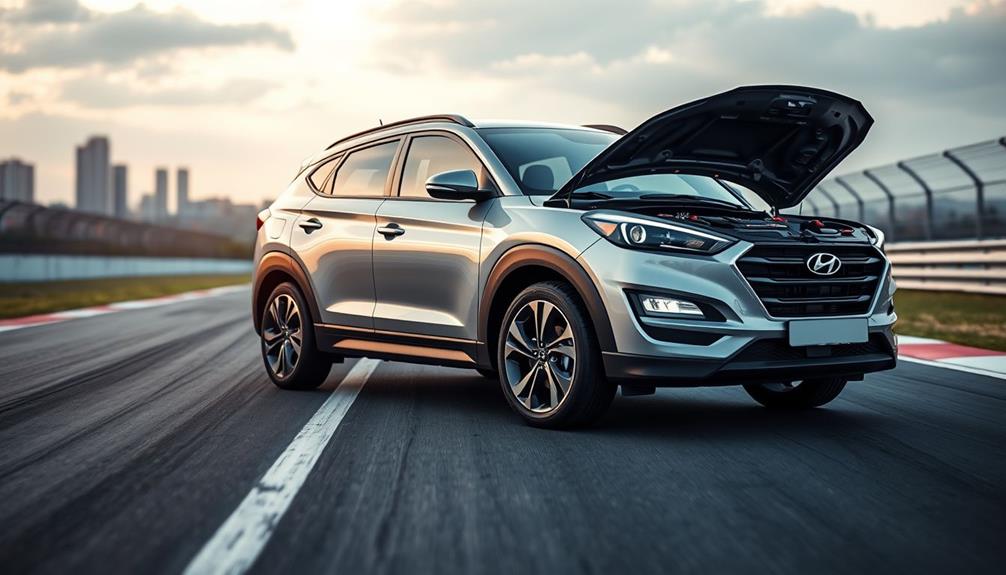
When you consider ECU tuning and performance chips for your Hyundai Tucson, you're looking at significant power and efficiency gains.
Custom tuning options can enhance your engine's output, while performance chips like those from Racechip can deliver impressive horsepower increases.
Just keep in mind that these modifications might affect your factory warranty, so it's smart to do your homework first.
Power and Efficiency Gains
Enhancing your Hyundai Tucson's performance can be achieved through effective ECU tuning and the installation of performance chips. With these modifications, you can experience a noticeable boost in power, potentially increasing horsepower by 15 HP and torque by 18-23 ft-lb. This means that your Tucson won't just feel faster; it will respond better when you hit the gas.
Performance chips, like the Stage 1 RocketChip, can also improve efficiency, yielding around a 10% increase in fuel economy. This enhancement translates to significant long-term savings at the pump, with some users reporting gas mileage improvements to about 27 MPG in the city and 31-32 MPG on the highway.
Custom tuning options, such as piggyback tuners, allow you to optimize your vehicle's performance without compromising reliability.
While the initial investment for tuning and performance enhancements may exceed $1,000, the gains in power and efficiency make it a cost-effective choice in the long run.
Engine Optimization Techniques
Engine optimization techniques, such as ECU tuning and performance chips, can dramatically elevate your Hyundai Tucson's capabilities.
By opting for ECU tuning, you could see an increase of up to 15 HP and a torque boost of 18-23 ft-lb, depending on your specific upgrades. This tuning process allows for precise adjustments to your vehicle's performance, enhancing power and drivability without disrupting the factory computer signals.
Using performance chips like the Stage 1 RocketChip ODB plug-in can also improve fuel efficiency by around 10%, making your Tucson not only faster but also more economical.
After turbo tuning modifications, many users report gas mileage improvements to approximately 27 MPG in the city and about 31-32 MPG on the highway, showcasing the dual benefits of added power and efficiency.
To maximize the advantages of these engine optimization techniques, regularly maintain your vehicle and use top-tier gasoline along with synthetic oil.
This guarantees your Tucson remains in peak condition, allowing you to enjoy long-term performance and longevity from your tuning efforts.
Embrace these enhancements and transform your SUV into a high-performance beast.
Turbocharger Upgrades for Maximum Output
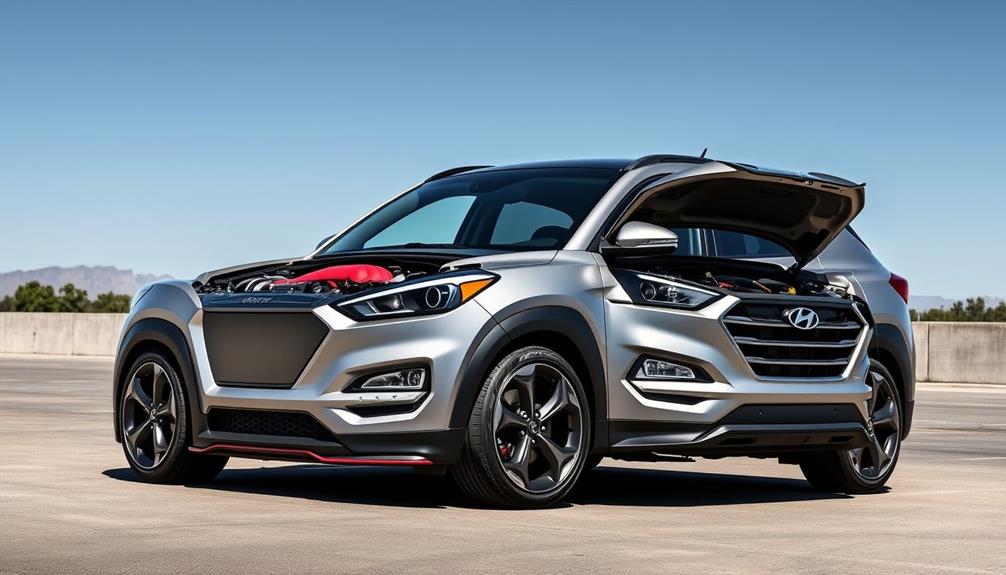
Turbocharger upgrades can take your Hyundai Tucson's performance to the next level, providing a significant boost in power output—often by 40-50 HP for turbocharged models. This increase not only enhances your vehicle's drivability but also improves fuel efficiency, making your Tucson more enjoyable to drive.
If you're considering a turbocharger installation, the Tucson's new 2.5 Smartstream engine offers a viable option, even though current aftermarket selections, like those from Shark Racing, are somewhat limited.
Pairing a turbocharger with proper performance tuning, including ECU modifications, can yield substantial gains in acceleration and throttle response. You'll likely notice your Tucson becoming a more versatile and powerful vehicle on the road.
However, keep in mind that performance tuning can void your factory warranty. It's important to weigh the benefits against potential risks before diving into modifications.
Many Tucson owners report improved gas mileage after turbo upgrades, achieving around 27 MPG in the city and 31-32 MPG on the highway, depending on driving conditions.
Essential Maintenance for Tuned Vehicles
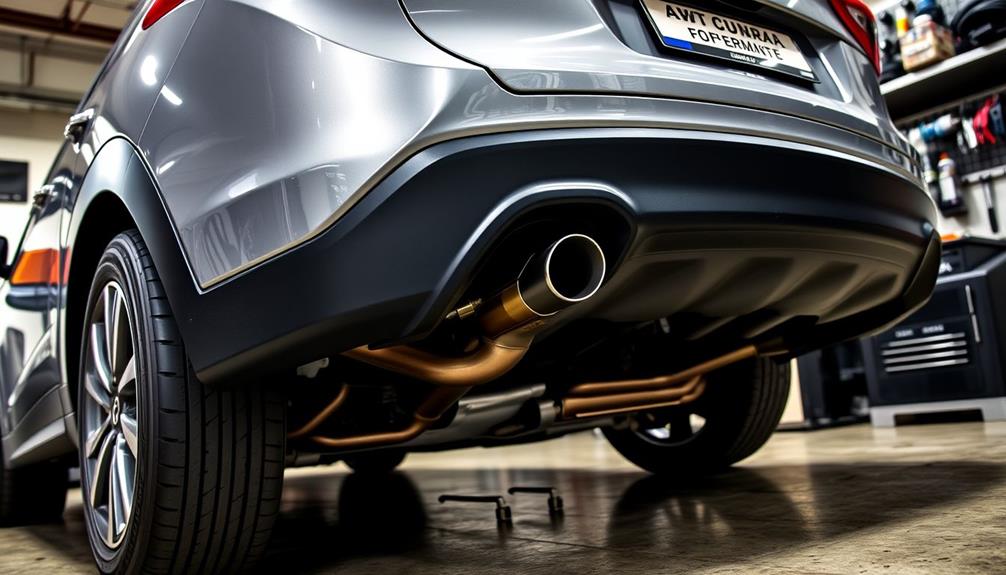
Maintaining a tuned vehicle like your Hyundai Tucson is essential for guaranteeing its performance and longevity.
Regular oil changes with premium synthetic oil are significant, especially after tuning modifications that may increase engine stress. Using top-tier gasoline optimizes both performance and fuel economy, which is important for vehicles that depend on precise fuel delivery.
Here are some key maintenance tips to keep your Tucson running smoothly:
- Install an oil catch can: This helps reduce oil deposits in the engine, improving overall performance and emissions.
- Monitor performance metrics: Keeping an eye on your vehicle's performance post-tuning helps identify any issues early, allowing for timely adjustments.
- Drive gently after tuning: Gradual driving during the initial startup is essential to prevent premature wear and guarantee the engine adapts to its new performance parameters.
Emissions Regulations and Legal Implications
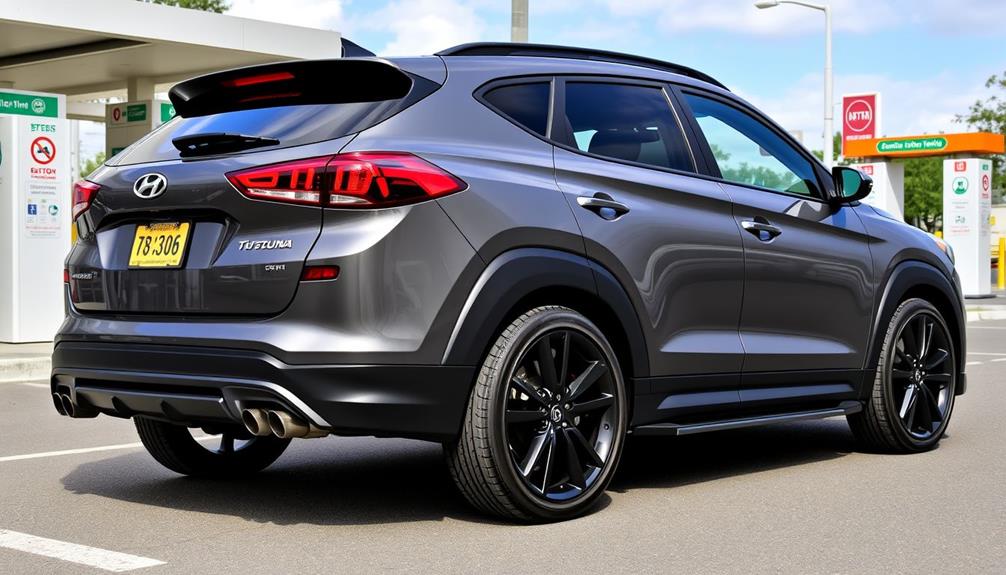
When tuning your Hyundai Tucson, you need to be aware of state emissions standards that can greatly impact your modifications.
Legal considerations around performance enhancements, like oil catch cans, vary widely, so it's essential to understand your local regulations.
Ignoring compliance testing requirements could lead to fines or penalties, so make sure you stay informed.
State Emissions Standards Impact
Maneuvering state emissions standards can be a complex task for Hyundai Tucson owners looking to tune their vehicles. Each state has its own set of regulations, and understanding these can make a significant difference in your tuning experience.
For instance, California enforces strict rules that might require an Executive Order for any modification, limiting your tuning options.
In states with emissions testing, such as New York, you may need to remove specific modifications like oil catch cans before inspections to stay compliant. Conversely, in places like Florida, where emissions testing is less stringent, you have more freedom to install performance chips and other enhancements.
Consider these factors when tuning your Tucson:
- Research your state's emissions regulations thoroughly.
- Be aware that modifications can impact your vehicle's inspection status.
- Understand that while oil catch cans can help improve emissions, their legality varies.
Staying informed about local emissions laws is vital. Non-compliance can lead to fines and the potential failure of your vehicle's inspection, so it's important to tune wisely while adhering to the regulations in your area.
Legal Modification Considerations
Steering through the legal landscape of modifications for your Hyundai Tucson can feel intimidating, especially with the varying emissions regulations across states. Each state has its own rules, which can greatly affect your tuning options.
For instance, California's stringent regulations require an Executive Order for any performance enhancements, making it vital to understand these legal modification considerations before you make changes.
In contrast, states like Florida have more relaxed emissions testing, allowing for greater flexibility in upgrades, including oil catch cans that can boost engine performance. However, even beneficial modifications might face legal challenges in certain jurisdictions.
It's important to familiarize yourself with your local emissions laws, especially if you're considering performance modifications. Non-compliance can lead to hefty fines or even prevent you from registering your vehicle.
Always check if your enhancements are permitted and whether you'll need to revert them before inspections. By staying informed about emissions regulations, you can guarantee your tuning journey doesn't come with unexpected legal hurdles.
Compliance Testing Requirements
Steering through compliance testing requirements is essential for ensuring your Hyundai Tucson meets emissions regulations. Different states have varying standards, and you'll need to be aware of what applies to your situation.
In California, for instance, modifications without an Executive Order are prohibited, which can limit your performance upgrades. Meanwhile, Florida offers a more lenient approach, making it easier to install modifications without facing penalties.
Before you engage in performance enhancements, consider these points:
- Research local emissions regulations: Understand the requirements specific to your state.
- Be cautious with modifications: Some enhancements, like oil catch cans, may boost emissions but can also raise legality concerns.
- Prepare for compliance testing: Be ready to remove certain modifications before inspections to pass.
Ultimately, ensuring compliance testing is part of your tuning journey. By staying informed on local regulations and understanding the legal implications, you can transform your Tucson into a high-performance beast without running into legal trouble.
Community Insights on Modifications
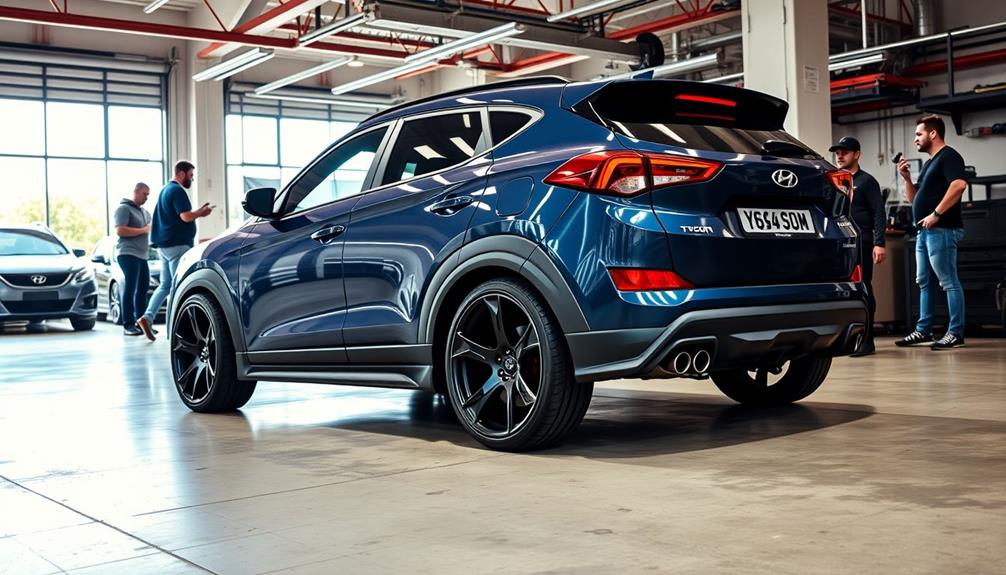
The Hyundai Tucson community is a vibrant hub for enthusiasts looking to enhance their vehicles through modifications. You'll find plenty of discussions about performance chips, with many Tucson owners reporting impressive gains—up to 15 HP and 18-23 ft-lb of torque—after proper tuning. Engaging in community discussions can provide you with valuable insights on which chips work best for your model and driving style.
Another popular modification is the installation of a catch can. Users on forums share that this addition helps reduce oil deposits in the engine, promoting better performance and longevity.
You'll also notice that many members emphasize the importance of driving technique. They argue that smooth power delivery and improved mileage often stem from thoughtful driving habits, rather than just raw horsepower.
Tucson Night Edition owners have reported that turbo tuning can greatly enhance gas mileage, achieving around 27 MPG in the city and 31-32 MPG on the highway.
To dive deeper into these modifications, regularly engaging in Hyundai forums is essential; it's a collaborative space for sharing knowledge, experiences, and recommendations, making your tuning journey even more rewarding.
User Experiences With Performance Enhancements
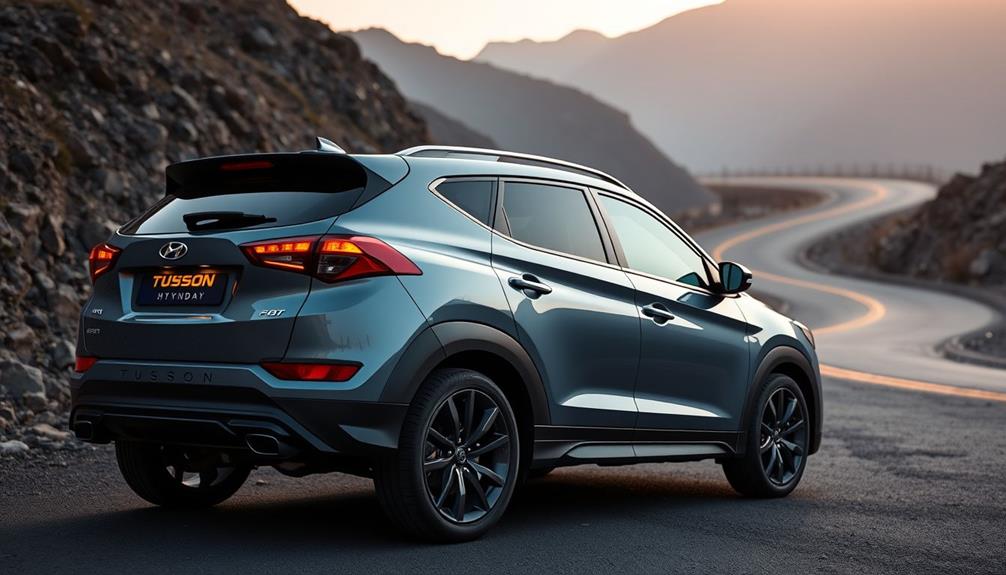
Performance enhancements for the Hyundai Tucson have transformed many owners' driving experiences, with users enthusiastically sharing their stories online.
One standout feature is the turbo tuning on the Tucson Night Edition, where drivers report substantial power gains and impressive gas mileage—around 27 MPG in the city and 31-32 MPG on the highway.
Custom tuning modifications often require professional help, so it's wise to seek out reputable facilities for installation to maximize performance.
Driving technique plays a significant role, and many owners emphasize that how you drive can influence performance even more than just raw horsepower.
Additionally, spark plug upgrades are frequently recommended as a complementary enhancement to get the most out of your tuning modifications.
Here are some key takeaways from user experiences:
- Turbo tuning can lead to significant power and efficiency improvements.
- Professional installation is essential for the best tuning results.
- Engaging with the community on forums offers valuable insights and support.
These shared experiences foster a collaborative environment, helping you make informed decisions on your journey to enhancing your Tucson's performance.
Market Trends in Tucson Tuning

Tuning the Hyundai Tucson is gaining traction as the compact SUV continues to dominate the market. With its rising popularity, you'll find a growing interest in aftermarket tuning options, particularly performance chips and turbo installations. And while the Hyundai Tucson is the primary focus of aftermarket tuning, the Hyundai Santa Fe 2015 tuning is also gaining attention among car enthusiasts. Both models offer great potential for upgrades, allowing drivers to enhance their driving experience and get the most out of their vehicles. As the demand for tuning options increases, we can expect to see a wider range of aftermarket upgrades available for these popular Hyundai SUVs.
As more Tucson models hit the streets, the demand for bolt-on superchargers and custom tuning solutions is on the rise, mirroring broader trends in vehicle performance enhancements.
User discussions in online forums showcase mixed feelings about performance chips, with many users reporting modest power and fuel efficiency gains. Still, the enthusiasm for tuning remains robust.
Recent trends also highlight that aftermarket support for Tucson tuning is expanding, especially concerning turbocharging options as engine technology evolves.
The advent of hybrid models presents unique challenges and opportunities for enthusiasts like you. While exploring ways to optimize performance, you must navigate the delicate balance of enhancing your Tucson without voiding warranties or impacting emissions compliance.
As the tuning landscape continues to evolve, staying informed about the latest developments will help you make the best choices for your high-performance Tucson.
Future Innovations in Tucson Performance

Exciting advancements are on the horizon for the Hyundai Tucson, as the brand commits to enhancing its lineup with innovative performance features. Future models may integrate TUCSON Hybrid technology, aligning with the growing demand for eco-friendly yet powerful SUVs. This shift not only caters to environmentally conscious consumers but also positions Hyundai as a leader in automotive innovation.
Here's what you can expect:
- Aftermarket upgrades: Hyundai's engineering team is exploring new ways to boost engine efficiency and power, ensuring you can personalize your driving experience.
- Bolt-on supercharger options: If you crave even more power, these enhancements could transform your Tucson into a true performance machine.
- Performance chips: These upgrades could optimize your Tucson's engine management system, allowing for improved throttle response and power delivery.
As Hyundai looks to the future, collaborations with cinematic projects may further elevate the Tucson's appeal, showcasing its capabilities in thrilling adventures.
With these innovations, your Tucson could soon become not just an SUV, but a high-performance beast ready for any challenge. Keep an eye out for these exciting developments!
Frequently Asked Questions
Can a Hyundai Tucson Be Tuned?
Yes, you can tune a Hyundai Tucson using performance chips and ECU tunes. These modifications enhance engine power and fuel economy, offering better throttle response and overall performance for your SUV when done correctly.
How to Improve Tucson Performance?
Think of your Tucson as a racehorse waiting to gallop. To improve its performance, install a performance chip, upgrade to a turbocharger, eliminate throttle lag with a GO PEDAL, and maintain it regularly for peak efficiency.
Can You Remap a Hyundai Tucson?
Yes, you can remap a Hyundai Tucson. By optimizing the ECU, you'll enhance engine power and efficiency. Just remember, modifications might void your warranty, so consider the benefits against potential risks before proceeding.
What Is the Most Common Problem With a Hyundai Tucson?
About 30% of Hyundai Tucson owners report premature brake pad wear as the most common problem. You'll also notice issues like malfunctioning fuel gauges and rough transmission shifts, which could impact your driving experience considerably.
Conclusion
So, you've turned your Hyundai Tucson into a high-performance beast, huh? Who knew your daily driver could also double as a track star? With all those modifications, you'll be the envy of the neighborhood—just don't forget to remind everyone how practical your "performance SUV" is for grocery runs. Embrace the irony: your sleek monster's greatest challenge might just be finding parking at the mall. But hey, at least you'll look good doing it!

